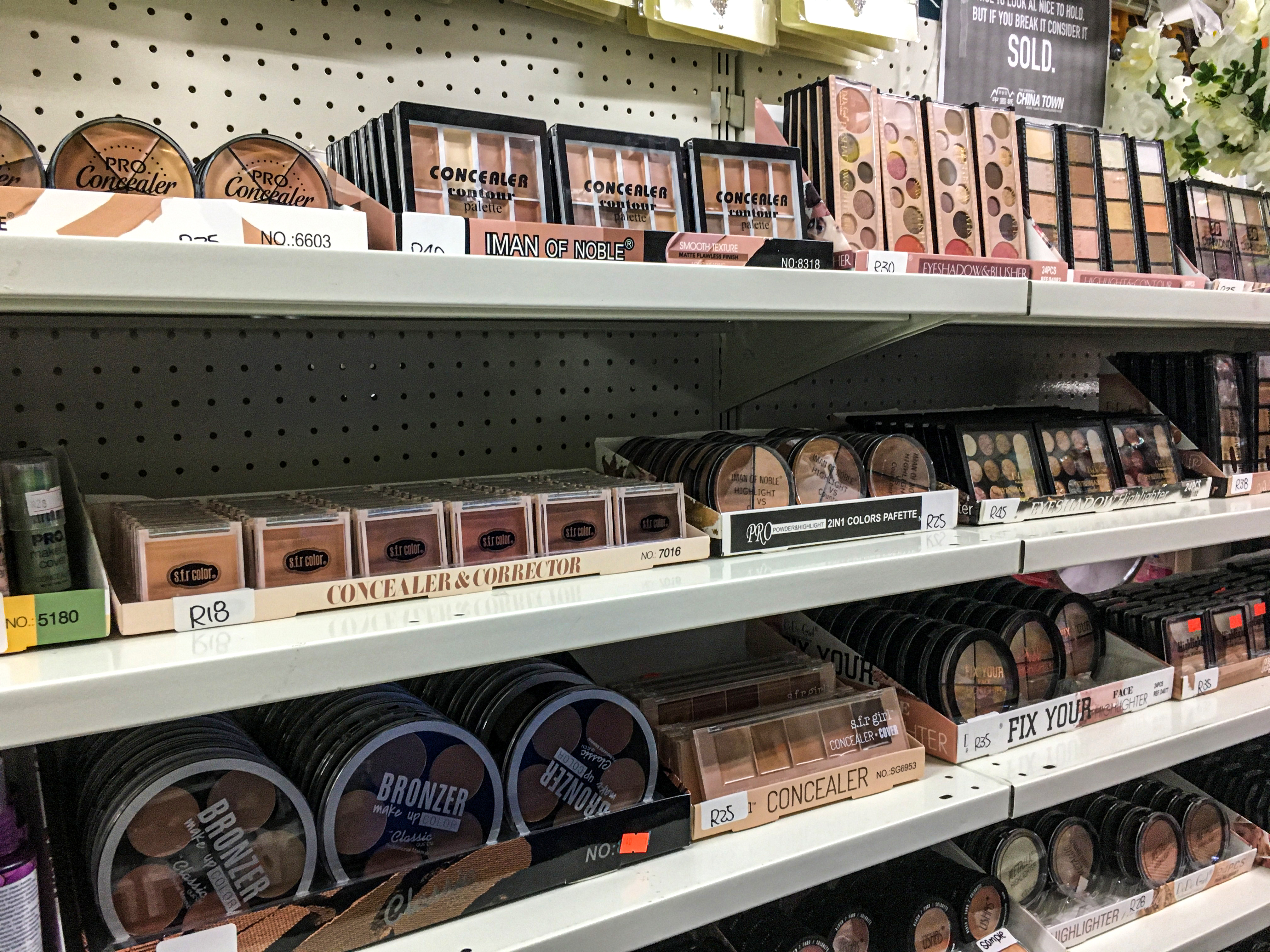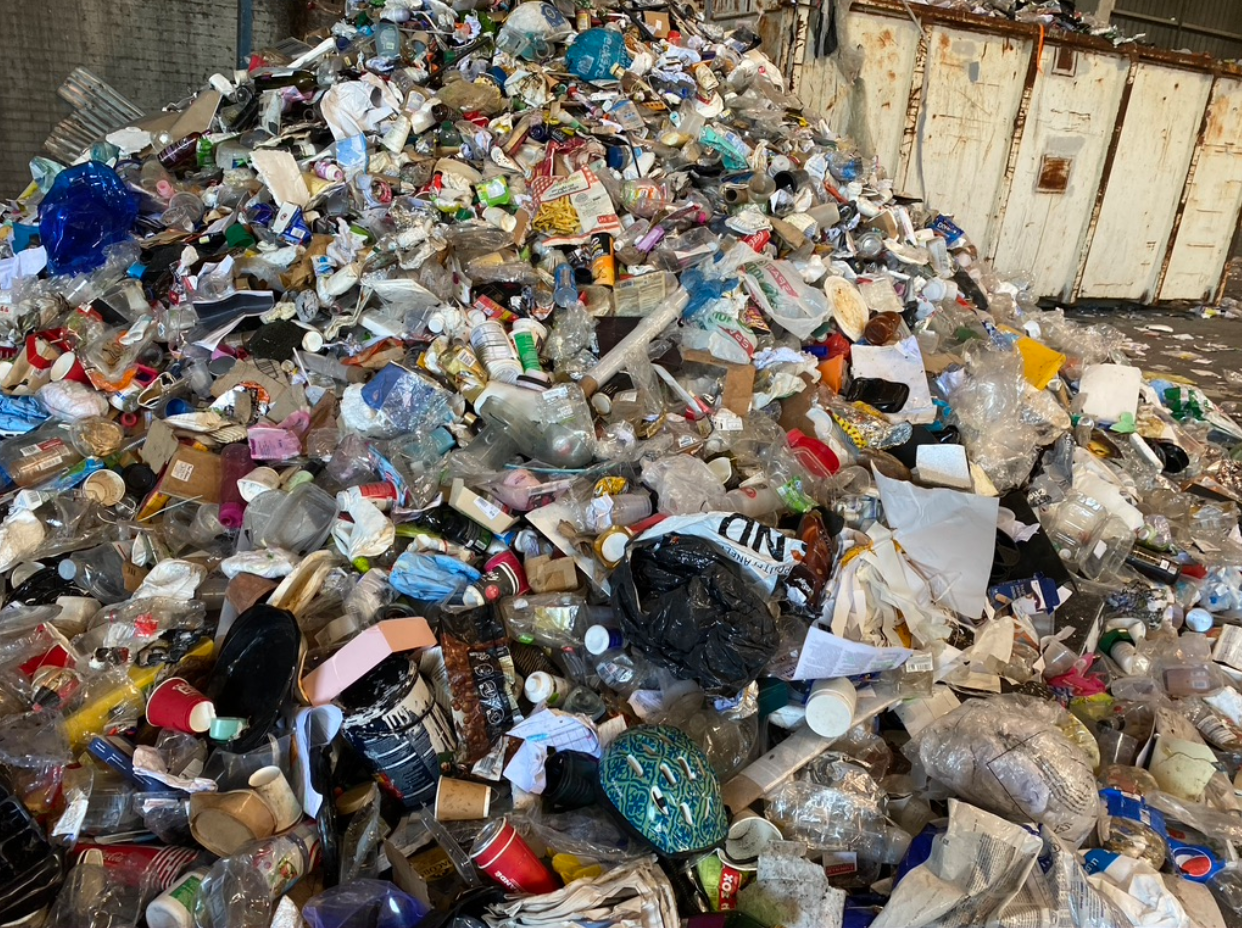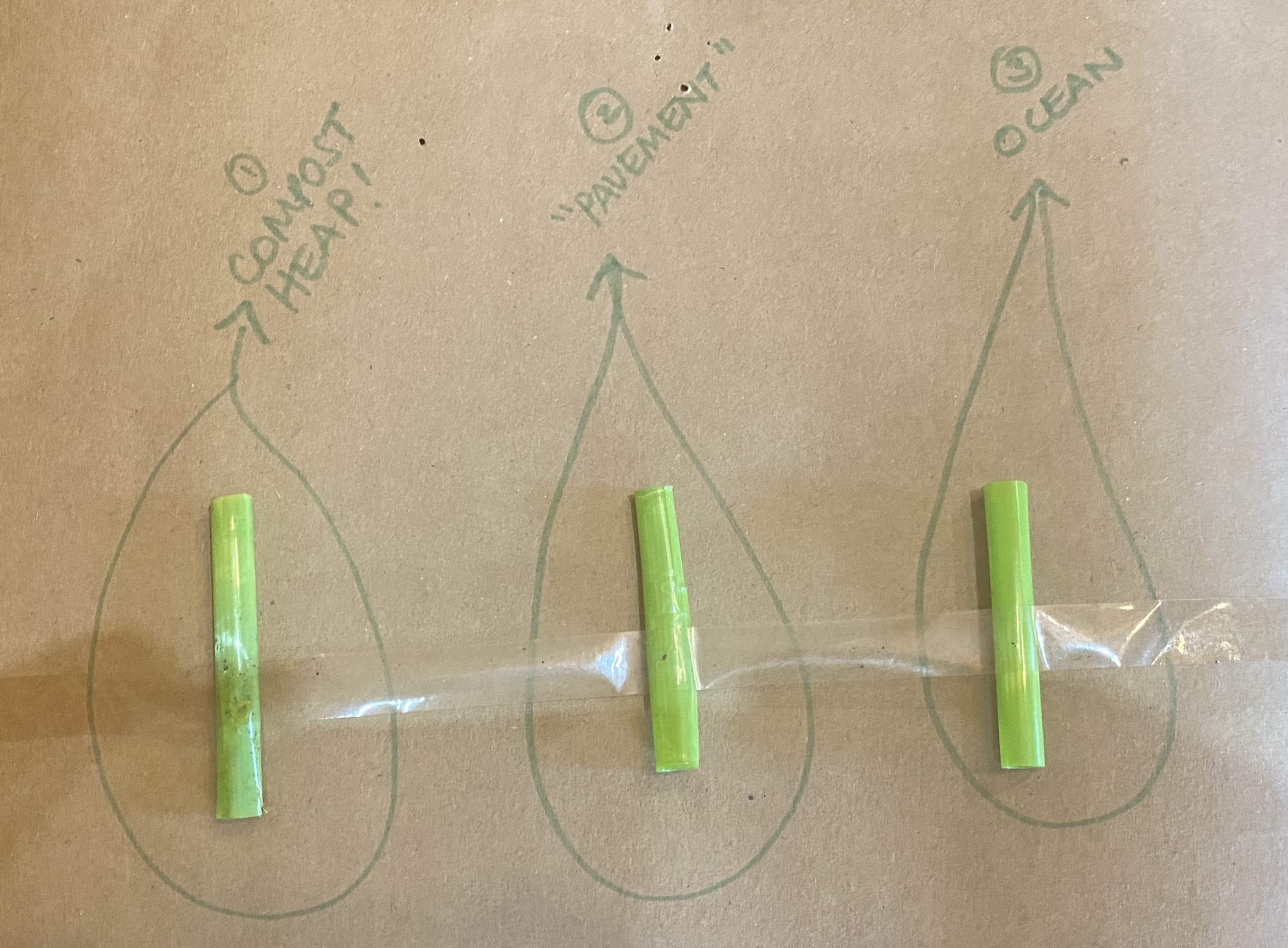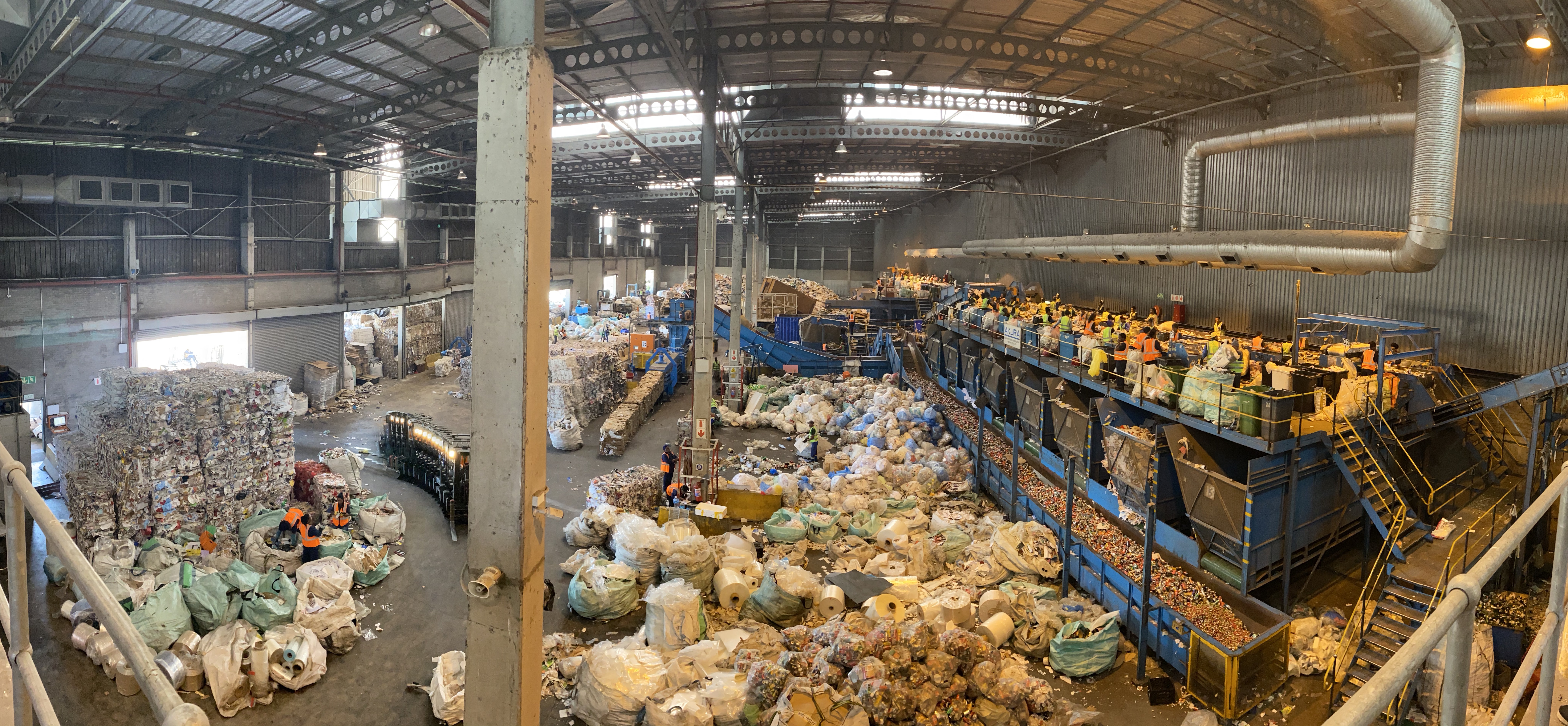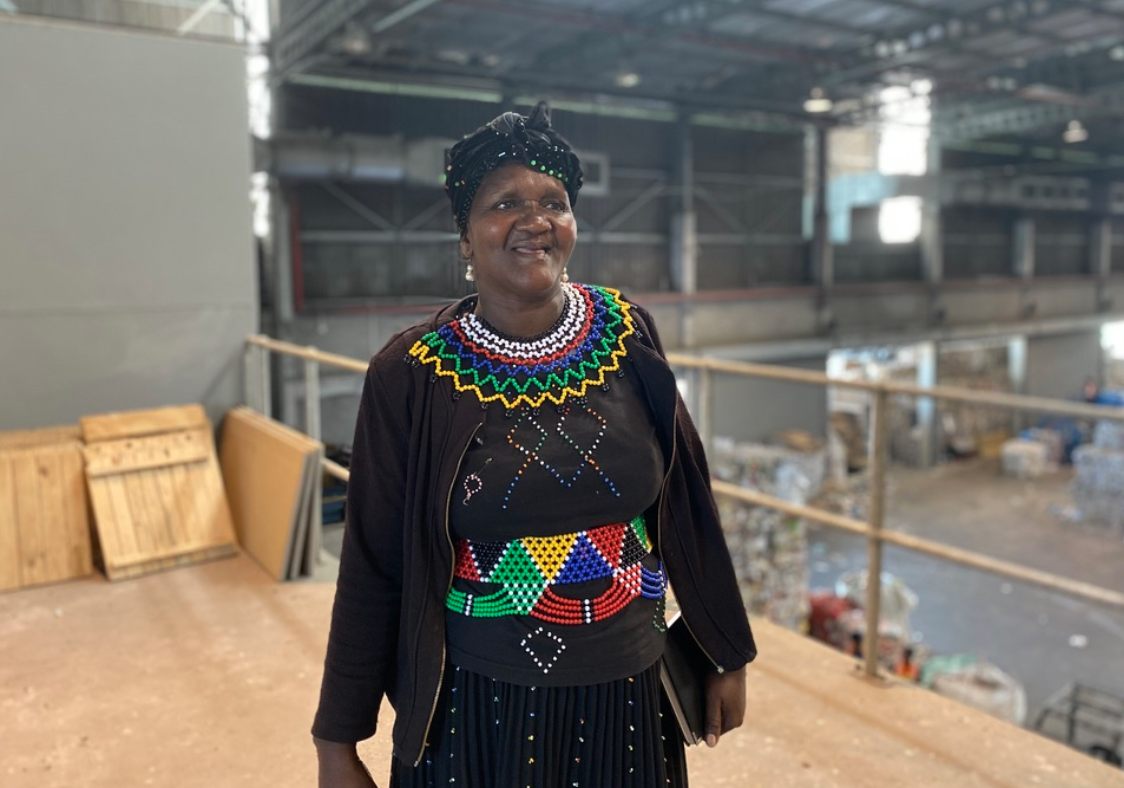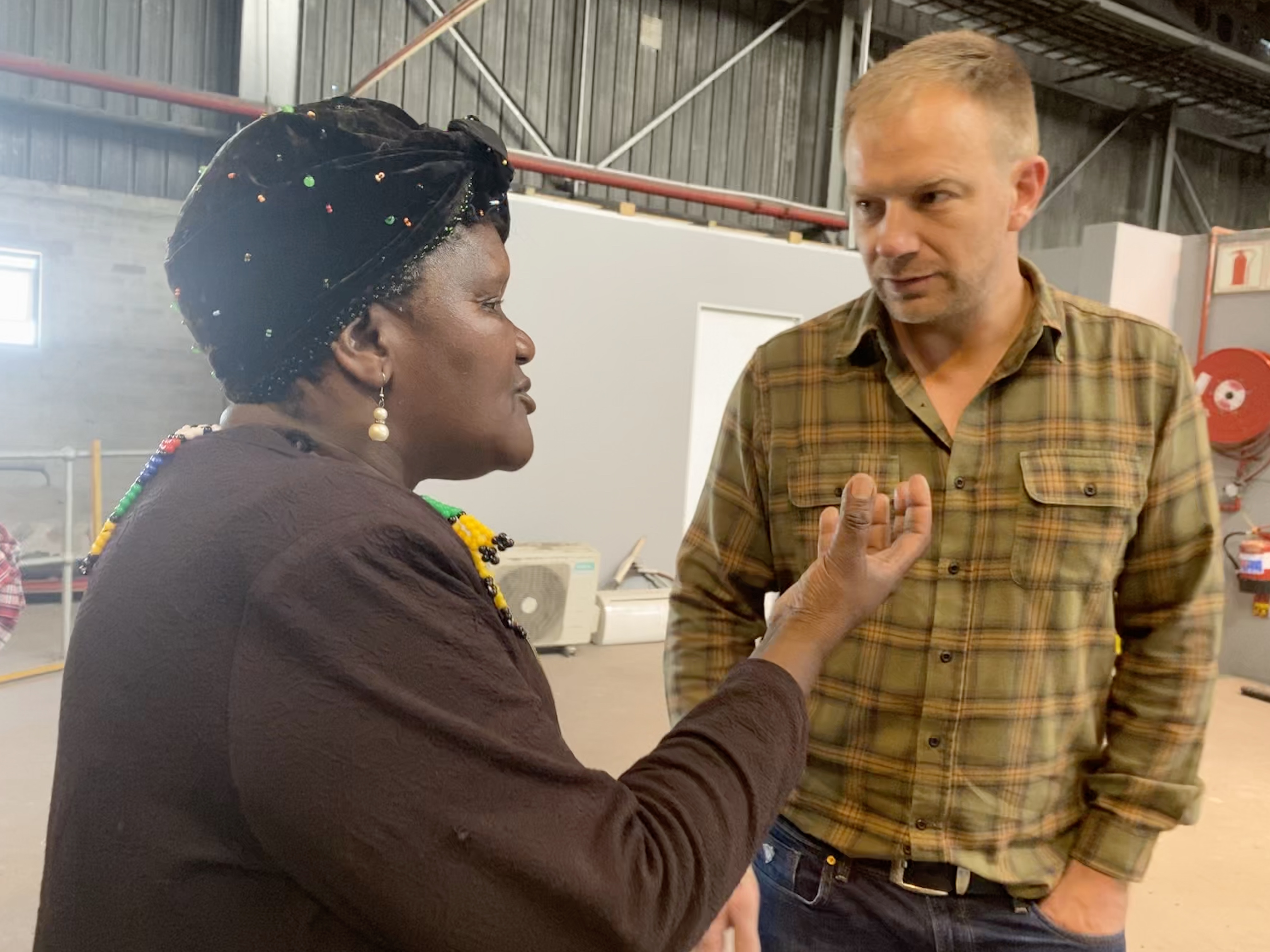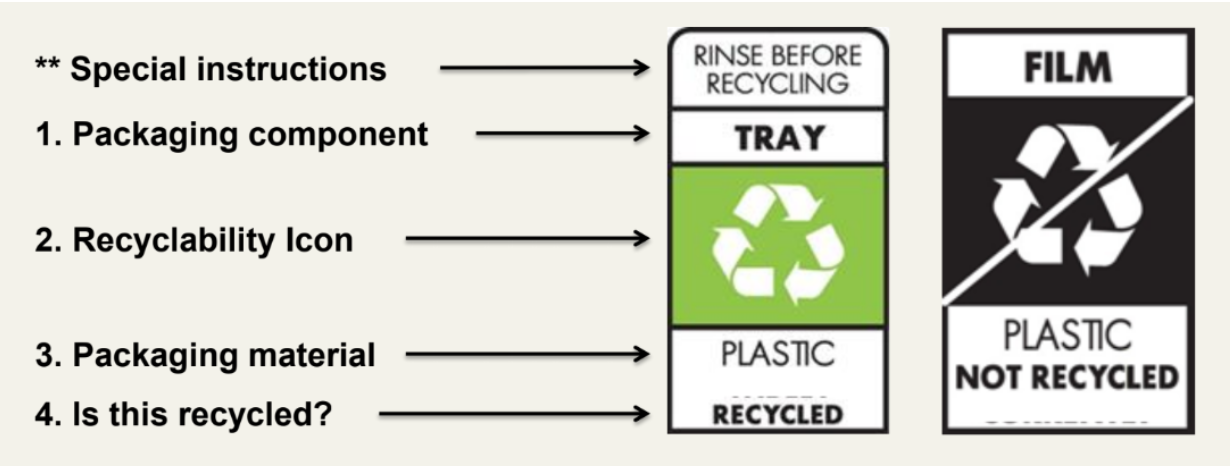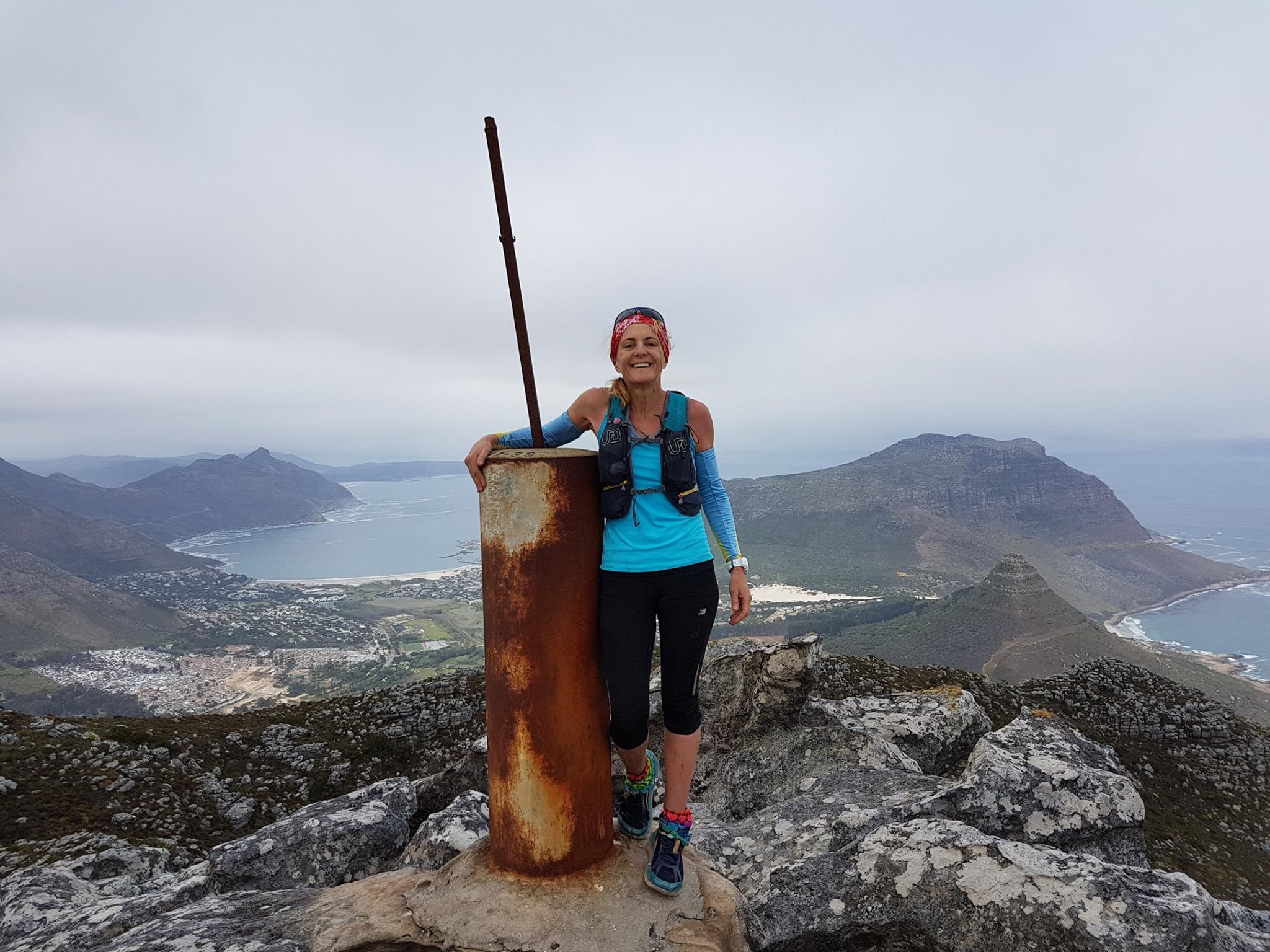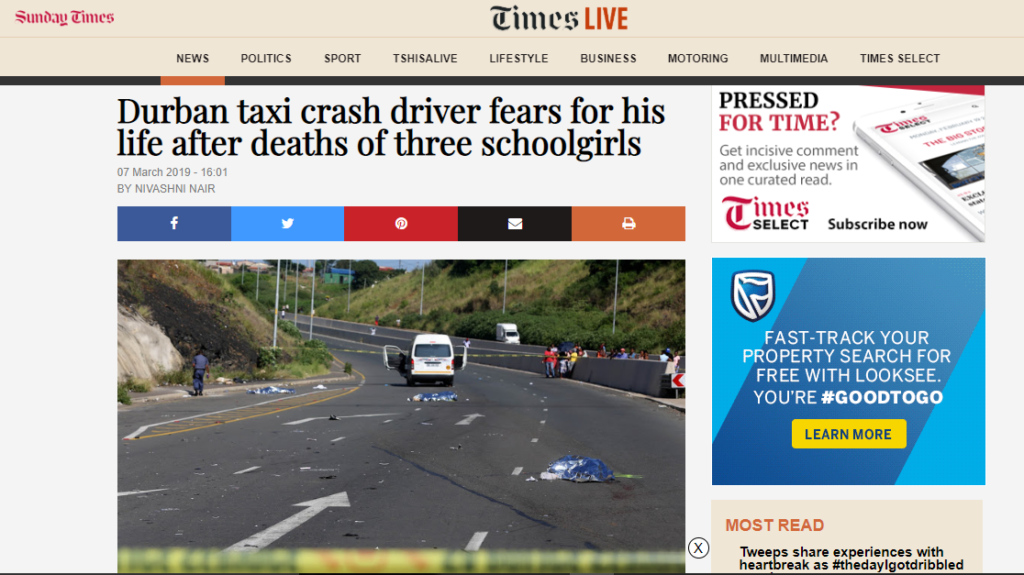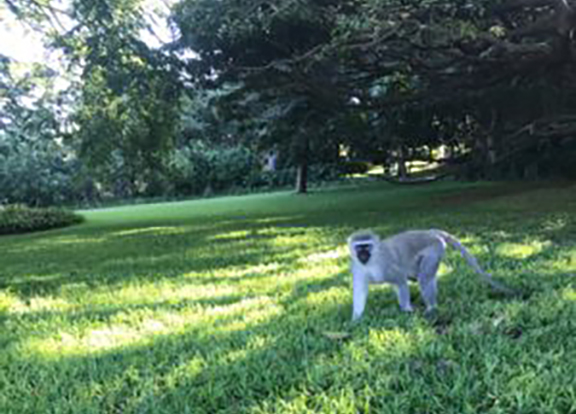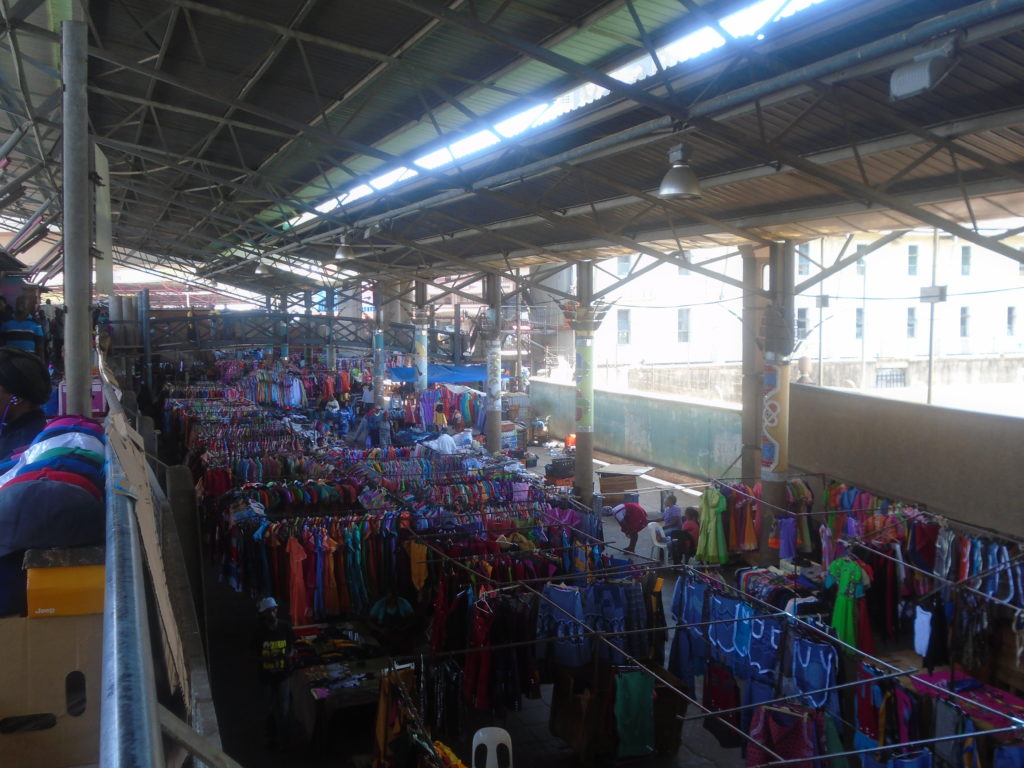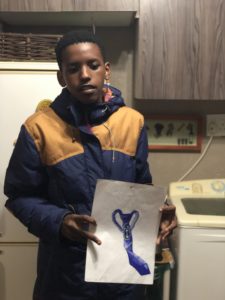By Maggie Connolly
MAIN IMAGE: Several shelves of makeup on display in a shop in Cape Town’s China Town mall. Products here are priced much lower than in other outlets. Source: Maggie Connolly
The woke wave has reached the global beauty industry.
Twenty years ago, darker-skinned South Africans, would have been hard-pressed to find products that suited their skin types or their skin tones.
But now brands fighting for their slice of the R25 billion South African retail cosmetics industry have begun to bring in shade ranges across the board. The catch is that these brands suit the wallets of very few people – and they don’t always address local needs.
While it is true that the cosmetics sections in supermarkets and pharmacies are filled with options, this is only true for some. A black South African would be lucky to find a shade that perfectly matches their skin. A white South African would have at least ten options to choose from and would most likely find a shade that matches their skin tone and type.
In most stores, people with lighter skin can find an inexpensive concealer that suits their tanned summer skin or fairer winter skin. It’s a quick in and out, no need to spend 20 minutes searching through the shelves for a brand that might carry something that works for them.
The market is leaving out a key consumer.
Makeup professionals say many international brands treat darker-skinned women’s needs as an afterthought. But some local brands are trying to close the gap.
Enter Swiitch Beauty: a rising South African makeup company created by 19-year-old Rabia Ghoor. It has middle-of-the-road prices and makeup that is aimed at women of all skin colors. The company may not have hundreds of products on offer, but each product caters for their consumer, or more importantly, their South African consumer.
Ghoor came up with the idea for her company at the age of 14 with a very specific goal in mind.
“This is South Africa,” she said. “For the most part every high-end brand offered here is either American, European or Australian.”
She decided to make it her business to bring something new to the local cosmetics offering.
She said the big corporates make products for particular international markets.
“Then they try to sell those exact same products to Africans. This consumer has a completely different set of skin conditions and trend awareness.”
She argues that it’s the responsibility of the brand to genuinely put the consumer first – and listen to feedback.
“I think the question that most beauty brands are facing now is how do we make [the consumer] feel like a part of it. I think it would be better, instead of trying to make them feel a part of it [by importing products tailored for other markets] just make them a part of it. Just involve them.”
Ghoor attributes her success in part to the fact that the bigger brands have not been creating products specifically for South Africans until recently. Now some are grappling with the new expectations of their consumers.
But, says Ghoor, this is not always done with adequate thought or product curation. Brands may release dozens of new shades of foundation that are aimed at demonstrating a new wave of “woke” culture but may still leave consumers feeling under-served.
Even some of the biggest brands have begun to recognize that they have been behind the curve.
“The conversation [about the need for diverse shades] has been around forever,” she said. “It’s just now that brands are waking up. You see brands coming out with 40-plus shades of foundations and making a huge hype around it. The consumer says, Rhianna did that three years ago, you guys are late. You’re just here for the hype.
“What they don’t realize is this consumer that they’re talking to is incredibly well educated. She can spot that inauthenticity from a mile away,” Ghoor said.
Another barrier for consumers is the issue of price.
Mmatlala Mabotja, who owns local brand Fancy Sapphire Cosmetics, thinks young people shouldn’t feel pressured to get the whole range of makeup all at once. Over the past 20 years, the scope of makeup has grown dramatically. These days consumers face an overwhelming number of product options – from foundations to highlighters, bronzers and eyebrow kits. This becomes unaffordable.
“They obviously [then] go to cheaper places, but I wouldn’t recommend this because this is your skin we’re talking about. You need to invest in high quality products,” she said. Rather, first-time buyers should save their money for fewer higher quality products.
Dermatologist Dr. Nomphelo Gantsho agrees that it matters what you put on your face.
She is concerned about the easy availability of cheap, poor quality products.
At the bottom end of the market, untested products are available for very low prices in outlets such as those at Cape Town’s China Town and on street corners. A cheap foundation that claims to provide perfect skin coverage can cost as little as R20 at such stores.
These products are generally unregulated.
“The problem is that the industry for illegal products is very big,” said Gantsho. “Things get taken off the market and they come back under different names.”
And it’s easy for those products to return, regardless of where they’re manufactured. According to Gantsho, South Africa’s borders are “porous,” and the cosmetics easily find their way into the country. There are also products that are manufactured illegally locally.
For a person on a budget, prices as low as R18 for a concealer, R35 for a kit with four bronzers and R12 for a lipstick are hard to beat.
These products don’t undergo the same clinical trials that high-end brands like MAC, Bobbi Brown or Benefit do. The middle- to lower-end brands that are sold in supermarkets and pharmacies will also have been tested professionally.
This is required by law. The brand or individual responsible for a product must also keep records on the testing for at least 10 years.
Gantsho said some of the most common harmful chemicals that may be in cheap products include topical steroids, hydroquinone and mercury.
Not only are these products potentially risky, they’re also “rubbish” according to makeup artist Marlinette Newman who has been in the business for 11 years.
Newman, who is herself a frequent Chinatown shopper, said she picked up a counterfeit Benefit ‘Benetint’ 3-pack to see what the knockoff had to offer.
“It’s rubbish – the (colour) payoff and performance. It was obviously nothing like the real deal.”
The originals cost much more and rely on the fact that they are generally of better quality to attract consumers. But, she said, many cosmetics are priced above the actual cost of manufacturing that product.
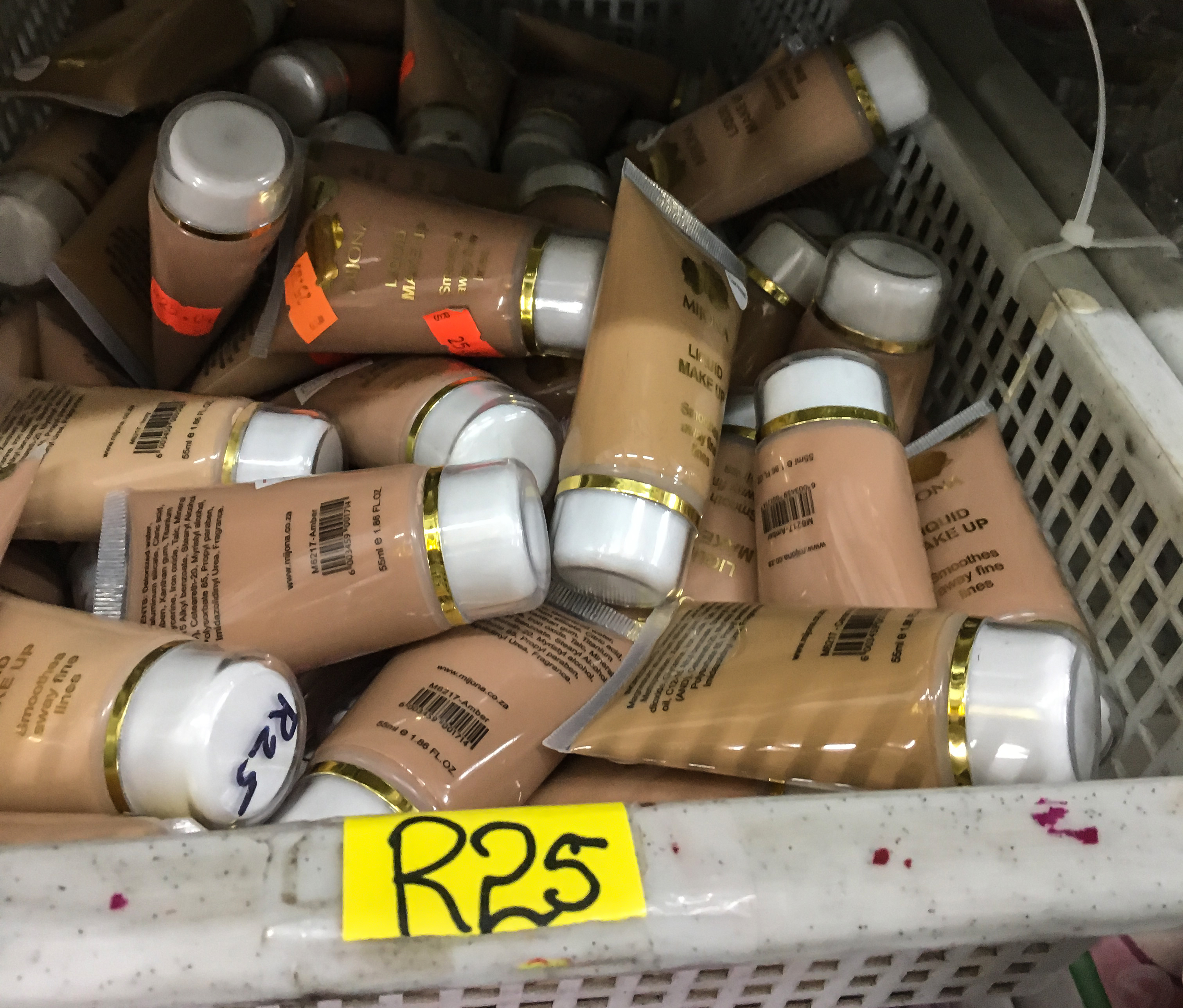
And some of the lower-priced brands are worth exploring. Among her favourite products, for example, is a low-priced mousse foundation which she said lasts long, blends well and is pigmented.
Newman said despite industry efforts to change things, shade range is still an issue for buyers.
While less expensive brands like Essence do have colors for darker skin tones, these are often limited to just a few. They offer nowhere near the same kind of range as brands like MAC, which she says is at the forefront of diversification in the makeup industry.
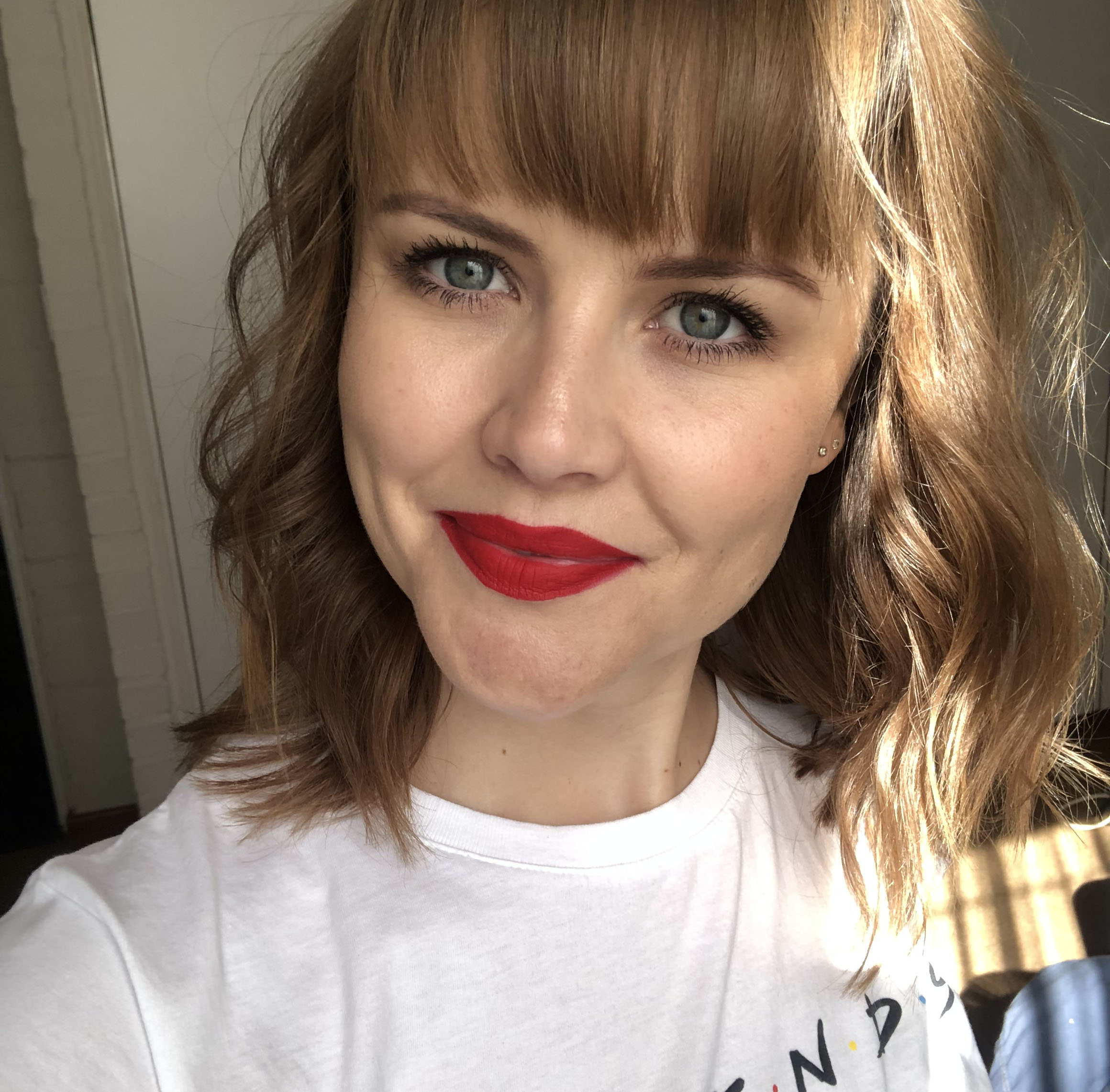
Source: Marlinette Newman
She credits Marco Louis, MAC’s Global Senior Artist for Sub Saharan Africa, with changing the way some brands operate. After living in Nigeria for several years, he came back to MAC with a plan.
He had encountered women who would spend a lot of time mixing their own foundations when they could not find anything to match their skin tone. According to Newman, Louis approached the company’s development team and showed them one of these mixed shades. He urged the team to branch out, arguing that they needed shades for these women.
Newman considers MAC and American brand Bobbi Brown as leaders in creating a wider color palette – an “ethical trend” that has trickled down to other international, lower-end brands in the last few years.
However, some of it is “smoke and mirrors”, she said. “They go: ‘This is who we are’ but they’re not always complying with it.” Even when brands release big new shade ranges, most of them only work for lighter skin tones.
However, South African brands like Sorbet, she said, are doing it right. They recently launched a line of 40 foundation shade and are busy redeveloping their offerings by looking at what’s selling and what’s not.
“I think local brands’ headspace is within the market and it is more relevant.”
But she is quick to say that international brands are not the enemy. Newman just thinks they’re missing something essential.
She said brands need to focus more on educating the consumer on what works for them.
The prominence of Instagram influencers who promote particular trendy makeup styles leads brands to cater for these specific looks. Current trends, for example, include the use of heavy bronzer to define the face and dark, unblended eyeshadow in the crease of the lid. Newman says these popular styles don’t always suit the ordinary person.
“It’s not actually personal to them. It’s not something that’s going to make them look more like them,” Newman said.
However some of it is “smoke and mirrors”, she said. “They go: ‘This is who we are’ but they’re not always complying with it.” Even when brands release big new shade ranges, most of them only work for lighter skin tones.
However, South African brands like Sorbet, she said, are doing it right. They recently launched a line of 40 foundation shade and are busy redeveloping their offerings by looking at what’s selling and what’s not.
“I think local brands’ headspace is within the market and it is more relevant.”
But she is quick to say that international brands are not the enemy. Newman just thinks they’re missing something essential.
She said brands need to focus more on educating the consumer on what works for them.
The prominence of Instagram influencers who promote particular trendy makeup styles leads brands to cater for these specific looks. Current trends, for example, include the use of heavy bronzer to define the face and dark, unblended eyeshadow in the crease of the lid. Newman says these popular styles don’t always suit the ordinary person.
“It’s not actually personal to them. It’s not something that’s going to make them look more like them,” Newman said.
Captions List:
Image name: chinatown1.jpg
Image name: chinatown3.jpg
Marlinette Newman, makeup artist, poses for a photo. Newman has worked in the makeup industry for 11 years. Photo by: Marlinette Newman
Image name: Newman.jpeg




